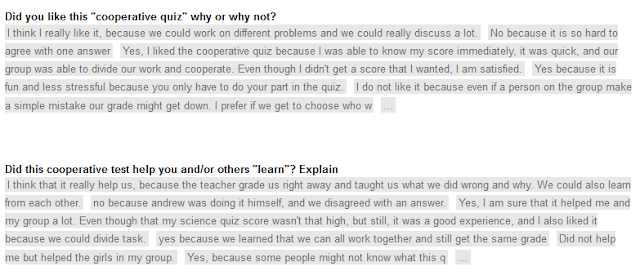Cooperative Learning in the Science Classroom
My sixth graders have had their first experience with cooperative learning. In nature, much of the learning in class is cooperative, but cooperative learning organizes learning around a few principals:
Obviously, the main objection is that students don't want to suffer from one anothers lack of work ethic which may penalize them. However, a lot of research supports cooperative learning in the classroom. My philosophy in implementing it is to do it with more formative tasks than a high value assessment. In the case of the quiz below, the quiz takes on more of a "group lab" feeling although the quiz is more assessment based and labs in my class are more inquiry based. I surveyed my students on a Google Form at the end of class to see what their feelings where on this new practice and the responses were pretty interesting.
Other advantages of cooperative learning:
I use cooperatively learning sporadically, and really make a point to debrief the process. It's important the the emphasis is not assessing "group skills" but rather using the group dynamic to meet educational objectives. Also, the activities should be very low risk and reward at first, and incrementally move upwards as the classroom culture becomes more supportive. Cooperative learning can be a fun way to build camaraderie, foster communication and engender a group sense of accomplishment.
Blended Learning
Using Flubaroo with Google Forms
Cooperative Learning Activity: Jigsaw
Making the most from Quizzes
- Everyone is accountable. Everyone sinks or swims together
- Assessment that reflects the above
Obviously, the main objection is that students don't want to suffer from one anothers lack of work ethic which may penalize them. However, a lot of research supports cooperative learning in the classroom. My philosophy in implementing it is to do it with more formative tasks than a high value assessment. In the case of the quiz below, the quiz takes on more of a "group lab" feeling although the quiz is more assessment based and labs in my class are more inquiry based. I surveyed my students on a Google Form at the end of class to see what their feelings where on this new practice and the responses were pretty interesting.
Other advantages of cooperative learning:
- Students get immediate feedback. An assessment can be graded quickly and give instant feedback to students and allow remediation if needed. Brain based learning supports quick reflection rather than taking home an assessment and giving it back a day or two later.
- Students can share and clarify ideas.
- Teachers can model good listening skills, speaking skills and procedures for arriving at a group consensus.
- Less paperwork
I use cooperatively learning sporadically, and really make a point to debrief the process. It's important the the emphasis is not assessing "group skills" but rather using the group dynamic to meet educational objectives. Also, the activities should be very low risk and reward at first, and incrementally move upwards as the classroom culture becomes more supportive. Cooperative learning can be a fun way to build camaraderie, foster communication and engender a group sense of accomplishment.
Blended Learning
Using Flubaroo with Google Forms
Cooperative Learning Activity: Jigsaw
Making the most from Quizzes


Comments
Post a Comment